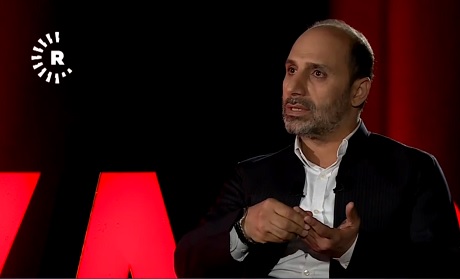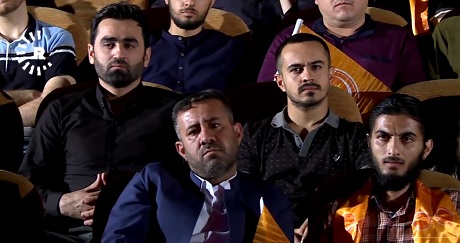ERBIL, Kurdistan Region — The Kurdistan Islamic Group (Komal) is optimistic heading into the parliamentary election because they see their party values and stances aligning with the electorate's, especially in the area of agriculture, and because of previous good governance.
"I am very much involved with the people, and I am aware of their plight and suffering. I hope I can relay people's concerns,” said Abdulsattar Majid, a Komal candidate, during a segment of Rudaw's '10 Questions' election TV program.
Majid has a full resume with experience in public administration, human rights, politics, civil society, and electoral systems in the Kurdistan Region.
"Our project and program is for an active parliament to exist. For it to be able to fulfill its three duties of legislating, monitoring government, and questioning it, also passing the budget, among other important duties," he said.

Abdulsattar Majid, a former KRG agriculture minister, predicts a strong showing by Komal in the Kurdistan Region's parliamentary election.
Majid was born in 1970. He has a bachelor's degree. He speaks German, Farsi, Kurdish, Arabic, and English. He is a member of the political council of Komal. He served as the head the Agriculture and Water Resources Ministry in the Kurdistan Regional Government's 8th cabinet.
He is vowing to "fight" for supporters just like he did as a minister when dealing with Iraq, Turkey and Iran for the rights of Kurdish farmers. Komal chose the election slogan ‘We don’t give up.’
"Mr. Abdulsattar Majid should go to the parliament because, throughout the past eight cabinets of the Kurdistan Regional Government [KRG], he has been the only minister known to all farmers and the people of Kurdistan — a man who fought Turkey and Iran over water and the resources of Kurdistan," affirmed Anwer Sabah.
Under Majid, the Kurdistan Region’s agricultural output increased, leading to self-sufficiency for certain products and allowing for a surplus to sell to Persian Gulf countries.
"If it hadn't been for the political conditions, non-harmonious politics, I might have been able to render better services for the agriculture and water resources sector," said Majid, who added the KRG prime ministry never hampered his work and gave him great discretion.

Potential Komal voters gather during a taping of Rudaw TV's '10 Questions' program.
Being in an Islamic party could dampen support as the dominant parties in the Kurdistan Region aren't defined by religion, a deviation from Iraq and the broader region.
Komal won 2 seats in Iraq's parliamentary election on May 12. They won six seats in the last election for the Kurdistan Region parliament in 2013.
The results of Iraq's election weren't accurate and fraudulent, maintained Majid, whose party joined a group of opposition parties in calling for a manual recount. After a partial manual recount, the federal court approved results that were identical for Kurdistani and most major Iraqi parties and candidates.
Majid hoped for a "good increase" in seats based on surveys and "reading" people in the street.
Majid argued conditions didn’t allow for forming a united front with the Kurdistan Islamic Union (KIU) and Kurdistan Islamic Movement (IMK).
"I believe the Islamic Komal, the 194 list, is better because its political stances have proven that it is in the service of the people and its interests ... our projects, works, stances and policies have benefited the public," said Majid.
He did not deny that the KIU-IMK's 'Towards Reform' alliance had good platforms as well, just that Komal's are better.
"Look at Islamic Komal's past, and then decide for its future,” added Majid.
Regarding other parties, Komal, alongside the Change Movement (Gorran), fiercely opposed the presidency of Masoud Barzani, head of the Kurdistan Democratic Party (KDP) and its proposed constitution.
They demanded a parliamentary system, rejecting meetings with the president. The KIU was split on the matter, but generally opposed the move of unilateral voting by Gorran and Komal before all parties could reach a consensus.
"We have prioritized like-mindedness, our internal harmony, and brotherhood, to have the same stances and purposes in the questions that arise here or in Baghdad, over a joint list that won't succeed tomorrow,” Majid added.
Kurdistan has a 111-member unicameral legislature that includes 11 minority quota seats. Official campaigning for the September 30th vote ends on Friday.
More: Election process explained...



Comments
Rudaw moderates all comments submitted on our website. We welcome comments which are relevant to the article and encourage further discussion about the issues that matter to you. We also welcome constructive criticism about Rudaw.
To be approved for publication, however, your comments must meet our community guidelines.
We will not tolerate the following: profanity, threats, personal attacks, vulgarity, abuse (such as sexism, racism, homophobia or xenophobia), or commercial or personal promotion.
Comments that do not meet our guidelines will be rejected. Comments are not edited – they are either approved or rejected.
Post a comment